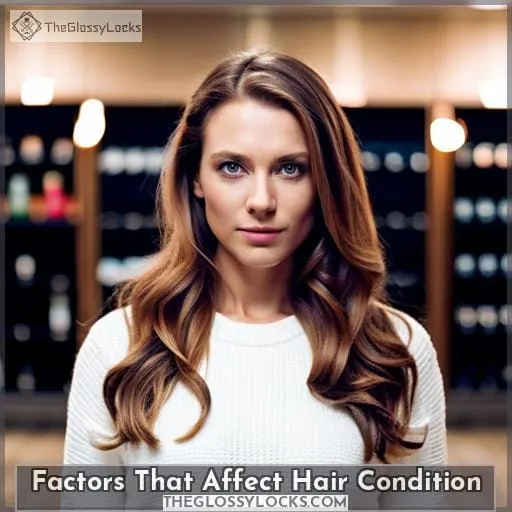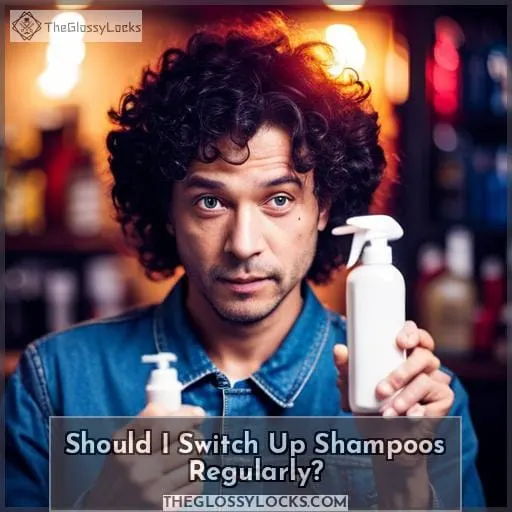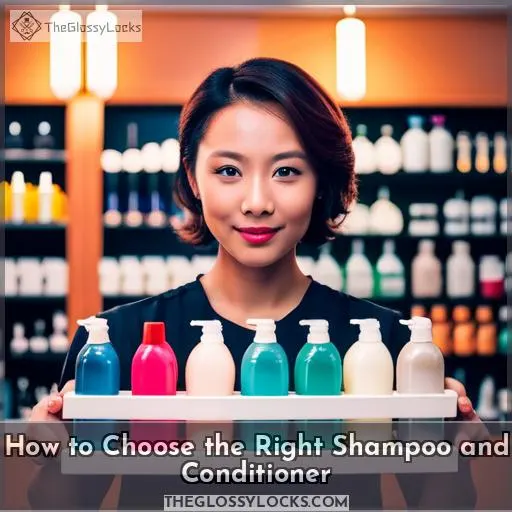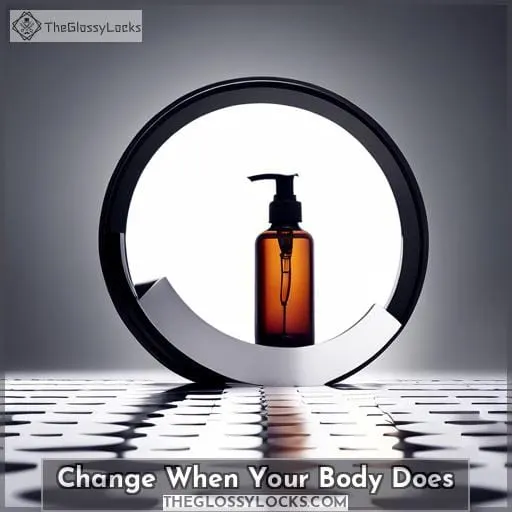This site is supported by our readers. We may earn a commission, at no cost to you, if you purchase through links.
Have you ever heard the theory that your hair can get used to a shampoo? It’s easy to believe, especially if you’ve been using the same product for years. But here’s what experts have to say: The truth is, hair doesn’t actually become immune or resistant to products over time.
Environmental factors like weather and pollution play a huge role in how our hair reacts. Chemical treatments like coloring and bleaching also affect our hair. Age also affects the condition of our locks.
As we grow older, it becomes more difficult for our scalp’s natural oils to keep them nourished.
So when should we switch up shampoos? Read on for some helpful tips!
Table Of Contents
Key Takeaways
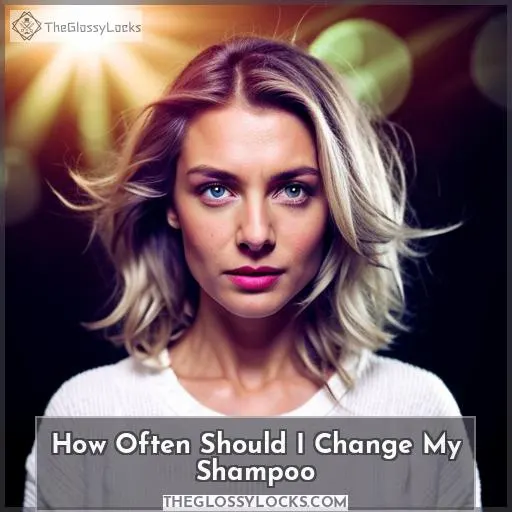
There is no set rule for how often you should change your shampoo. Factors such as environmental conditions, age-related changes, and lifestyle habits can affect your hair’s needs. Choosing the right shampoo and conditioner for your hair type and specific needs is important for maintaining its health and shine.
Factors That Affect Hair Condition
You may have noticed that your hair has different needs throughout the year. This is due to a variety of factors, including environmental, chemical, and age-related changes.
Environmental conditions, such as exposure to the sun or pollution, can cause dryness or greasiness in your hair. Chemical treatments, like coloring, can damage its structure and texture. Age also affects how healthy your hair looks.
It’s not uncommon for people over 40 years old to experience more dryness than younger individuals.
Knowing these factors will help you decide how often you should switch up your shampoo and conditioner routine to keep your locks looking their best!
Environmental
The environment can have a drastic effect on your hair’s condition. Exposure to the sun can dry it out, while pollution can make it greasy faster. It’s important to pay attention to how external factors are affecting your hair and adjust product use accordingly.
When selecting shampoo and conditioner, weather effects such as heat damage or dry scalp caused by colder temperatures should be taken into consideration. For color-treated hair, sun damage is a major factor that requires sulfate-free shampoos to preserve its hue and moisture levels.
Using an appropriate shampoo with clarifying properties is recommended to prevent pollution from speeding up the process of dirt build-up leading to dullness.
Chemical
Take into account the chemical treatments you may have had done to your hair, such as bleaching or coloring, when selecting a shampoo and conditioner. Consider products that are free of harsh chemicals like lauryl sulfate for maximum moisture preservation.
For color-treated hair, look out for Design Essentials line of nourishing shampoos that contain natural ingredients to protect strands from damage caused by environmental factors.
Keeping these factors in mind while considering weather impact and product selection will help determine the best conditioners and shampoos suited to individual needs.
Age
As you age, your hair may become more delicate and prone to breakage. To combat this, consider using products specifically designed for mature hair, such as Paul Labrecque’s Color Shampoo, or a deep moisturizing conditioner like the one recommended by hairstylist Alicia Bailey.
Protect your hair from sunlight with a color-protect shampoo and from pollution with a thickening spray. Climate also plays a factor in hair health, so take care to adjust product usage accordingly for optimal results.
Should I Switch Up Shampoos Regularly?
Knowing how your hair changes with the seasons and other factors is key to picking a shampoo that works for you, so consider mixing it up every now and then! Regular washing is important for keeping your scalp healthy; however, over-washing can lead to damage.
It’s best to use specific products based on hair type and condition rather than sticking with one particular brand of shower product all year round.
When selecting a shampoo or conditioner, product ingredients should also be taken into account. Sulfate-free formulas are often recommended as they help preserve color treatments while cleansing gently.
Lifestyle choices such as swimming in chlorine pools can strip away natural oils from the scalp, which will require special care afterwards. To maintain great hair overall, make sure you take into consideration factors like environment, chemical treatments used on your locks (like coloring), age-related issues, etc.
How to Choose the Right Shampoo and Conditioner
Choosing the right shampoo and conditioner for your hair can be difficult, but it doesn’t have to be! When selecting a product, consider your hair texture, type, and condition. If you have color-treated hair, then look for gentle sulfate-free formulas that will help preserve the color.
Additionally, regional climate change or lifestyle choices like chlorine pools should factor into what kind of shampoo you use as well.
Lastly, when choosing a conditioner, focus on what works best with your specific type of hair.
Hair Texture, Type, and Condition
Discovering the right shampoo and conditioner for your hair texture, type, and condition can be like a treasure hunt – but it’s worth taking the time to find that perfect match! Consider your region as well as your daily lifestyle when selecting products.
Hair color, particularly bleach-treated locks, will need special attention. Sun exposure can diminish oils from the scalp, while pollution may cause lankness or greasiness. Central heating in winter months also leads to moisture loss. When shopping around, look for gentle sulfate-free formulas suitable for color preservation.
Lightweight conditioners are great for fine tresses, while deep moisturizing ones work best on medium to coarse textures.
Color-Treated Hair
If you have color-treated hair, it’s important to choose a gentle, sulfate-free shampoo to preserve your hue and moisture.
- Consider climate effects – sun damage can dry out your locks; central heating in winter months depletes moisture from the hair shaft.
- Take into account time of year – summer heat and humidity can cause lankness or greasiness while cold weather may lead to dryness.
- Adjust based on color change – bleached tresses will need special attention.
- Craft a specific needs regime – take care when choosing shampoos and conditioners as they should be tailored according to texture, type, and condition.
- Follow up with Hair Health – once you’ve settled on products, stick with them for best results!
Ultimately, look after your colored strands by creating an individualized product regime that suits both seasonal changes and daily lifestyle habits
Regional and Lifestyle Considerations
Consider your regional climate and lifestyle habits when fine-tuning your shampoo and conditioner selection. Specific environmental factors, such as pollution, humidity, or sun exposure, can affect hair health.
Consult with an artistic director to determine the best products for your hair texture and condition. Craft a successful haircare regime that takes into account seasonal challenges, like central heating in winter months or summer heat causing lankness or greasiness.
| REGIONAL CLIMATE | LIFESTYLE HABITS |
|---|---|
| Dry & sunny | Active outdoors |
| Humid | Styling tools |
| Cold | Chemical treatments |
Consider both regional climate (such as dry/sunny) and lifestyle habits (like using styling tools) when choosing shampoo and conditioner to achieve healthy strands all year long!
Choosing the Right Conditioner
When it comes to choosing the right conditioner for your hair, let your unique texture and type be the guide. Consider different product selections based on a range of factors: conditioner ingredients, weather effects, color bleaching, and more.
Paul Labrecque Salon recommends selecting shampoos and conditioners that are formulated with specific needs in mind, from fine strands to coarse curls. Stay attuned to the changing state of your hair, as there are loads of factors that can affect its health or feel, such as temperature changes and environmental pollutants.
Change When Your Body Does
Pay attention to your hair’s condition and adjust the products you use accordingly. It’s important to stay attuned to how your hair feels, as factors such as sun exposure, central heating, and pollution can all affect its healthiness.
Disregard commonly believed myths like your body getting used to a product or shampoo, and instead focus on what works best for you. Mixing up the products depending on current needs will ensure that your ultimate goal of having healthy hair is achieved in time.
This could involve switching out shampoos every space of a year or so; however, it ultimately depends on individual circumstances and preferences too.
The Ultimate Goal: Healthy, Nourished Hair
Making the switch from one shampoo to another is all about finding what works for you and your hair. After taking into account factors like texture, type, condition, and lifestyle, it’s time to focus on achieving healthy, nourished hair as the ultimate goal.
Here are four steps that will help get you there:
- Find products with ingredients specifically designed for scalp health.
- Keep an eye out for weather-related changes in how your hair feels.
- Take extra care when using color-treated or bleached locks by protecting them with a gentle sulfate-free shampoo.
- Finally, be sure to keep up regular maintenance of changing shampoos depending on current needs – this might involve switching every few months or so!
Remember that everyone’s individual circumstances differ – so take these tips as just guidelines.
Frequently Asked Questions (FAQs)
What is the best way to switch shampoos?
Choose shampoo and conditioner based on your hair texture, type, and condition. Switch up products if they contain harmful ingredients or do not cleanse properly. Consider your region and lifestyle when selecting a product that is tailored to your needs for the best results.
What ingredients should I look for in a shampoo?
When selecting a shampoo, look for ingredients that will nourish and protect your hair. Choose a gentle formula free of sulfates and harsh chemicals, especially if you have color-treated hair. For different hair textures or conditions, select appropriate products to keep your locks looking their best.
Are there any shampoos that are good for all hair types?
Yes, there are shampoos that are suitable for all hair types. Look for formulas that contain natural ingredients like oat proteins and nourishing oils to hydrate and protect your hair. If you have color-treated or processed hair, choose sulfate-free shampoo so that it stays moisturized without stripping away its natural oils.
How often should I deep condition my hair?
Deep condition your hair as often as needed to maintain its health and shine. Exaggerate how luxurious it will feel afterward, and you’ll soon fall in love with the results! A good rule of thumb is to deep condition every 1-2 weeks for the best results, depending on your hair type or climate conditions
Is there any way to prevent hair damage caused by environmental factors?
Protecting hair from environmental damage is like building a fortress around it. Choose a shampoo and conditioner that work for your texture, type, and condition. Use products specifically designed to protect against UV rays or pollution if needed.
Conclusion
It can be confusing to know when to switch up shampoos. The truth is that it depends on your hair’s condition and the environment you live in. Factors like weather, exposure to the sun, and pollution can all affect hair health, meaning you may need to mix up your products occasionally.
Ultimately, the best thing you can do is pay close attention to your hair’s needs and select the shampoo and conditioner that best suits it.

